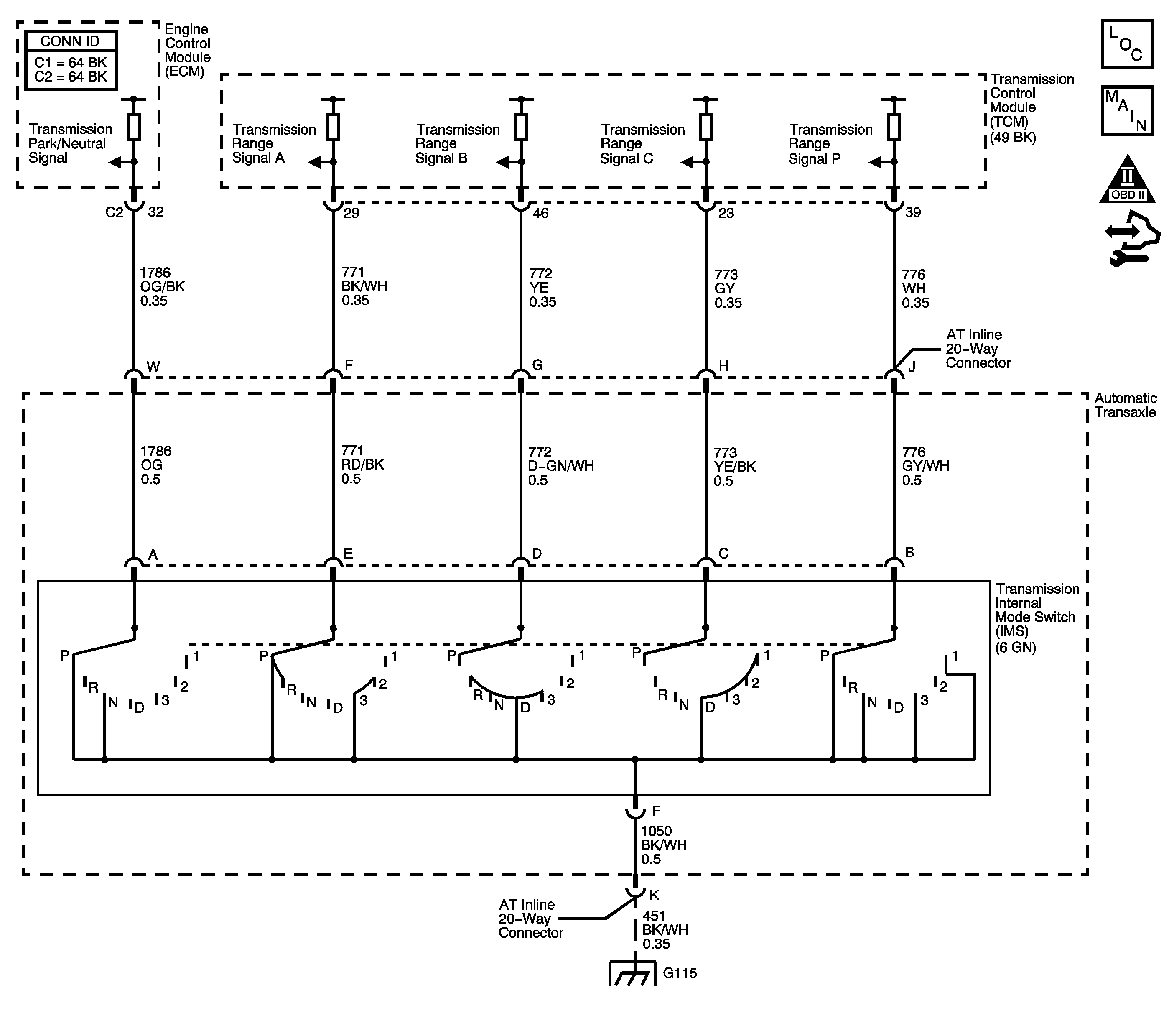
Circuit Description
The transmission internal mode switch (IMS) is a sliding contact switch attached to the selector detent inside the transmission side cover. The 4 inputs to the transmission control module (TCM) indicate the position of the transmission range selector. The input voltage level at the TCM is high, B+, when the IMS is open and low when the switch is closed to ground. The 4 input parameters represented are Signals A, B, C and P - Parity. Refer to Transmission Internal Mode Switch Logic .
If the TCM detects that IMS Signal A is always low, then DTC P1820 sets. DTC P1820 is a type B DTC.
DTC Descriptor
This diagnostic procedure supports the following DTC:
DTC P1820 Internal Mode Switch A Circuit Low Voltage
Conditions for Running the DTC
| • | The engine speed is greater than 500 RPM for 5 seconds. |
| • | The IMS indicates PARK or NEUTRAL for 1 second or greater. |
| • | The engine torque is greater than 50 N·m (37 lb ft). |
Conditions for Setting the DTC
The IMS indicates transitional position D4-D3 for 8 seconds or greater.
Action Taken When the DTC Sets
| • | The TCM requests the ECM to illuminate the malfunction indicator lamp (MIL) during the second consecutive trip in which the Conditions for Setting the DTC are met. |
| • | The TCM commands maximum line pressure. |
| • | The TCM commands an alternate coast shift pattern where downshifts occur at higher vehicle speeds while coasting. |
| • | The TCM freezes transmission adaptive functions. |
| • | The TCM assumes D4 for shifting. |
| • | The TCM disables TAP Shift operation. |
| • | The TCM records the operating conditions when the Conditions for Setting the DTC are met. The TCM stores this information as Failure Records. |
| • | The TCM stores DTC P1820 in TCM history during the second consecutive trip in which the Conditions for Setting the DTC are met. |
Conditions for Clearing the DTC
| • | The ECM turns OFF the MIL after the third consecutive drive trip in which the TCM does not send an MIL illumination request. |
| • | A scan tool can clear the DTC. |
| • | The TCM clears the DTC from TCM history if the vehicle completes 40 warm-up cycles without an emission-related diagnostic fault occurring. |
| • | The TCM cancels the DTC default actions when the ignition switch is OFF long enough in order to power down the TCM. |
Test Description
The numbers below refer to the step numbers on the diagnostic table.
-
A low value for Signal A indicates a short to ground in the engine harness or the TCM.
-
This step tests the internal transmission harness. A value of LOW for Signal A indicates the fault is in the harness; otherwise the fault is in the switch.
Step | Action | Yes | No |
|---|---|---|---|
1 | Did you perform the Diagnostic System Check - Vehicle? | Go to Step 2 | |
2 |
Important: Before clearing the DTC, use the scan tool in order to record the Failure Records. Using the Clear Info function erases the Failure Records from the TCM. Does the scan tool IMS parameter indicate Drive 4? | Go to Testing for Intermittent Conditions and Poor Connections | Go to Step 3 |
Does IMS signal A indicate LOW? | Go to Step 4 | Go to Step 5 | |
4 | Test the TR signal A circuit of the IMS for a short to ground between the TCM connector and the AT Inline 20-way connector. Refer to Testing for Short to Ground and Wiring Repairs . Did you find and correct the condition? | Go to Step 9 | Go to Step 8 |
Does IMS signal A indicate LOW? | Go to Step 6 | Go to Step 7 | |
6 | Replace the automatic transmission wiring harness. Refer to Wiring Harness Replacement . Did you complete the replacement? | Go to Step 9 | -- |
7 | Replace the lever assembly-manual shaft detent with internal mode switch. Refer to Manual Shift Detent Lever with Shaft Position Switch Assembly Removal . Did you complete the replacement? | Go to Step 9 | -- |
8 | Replace the TCM. Refer to Control Module References for replacement, setup and programming. Did you complete the replacement? | Go to Step 9 | -- |
9 | Perform the following procedure in order to verify the repair:
Has the test run and passed? | Go to Step 10 | Go to Step 2 |
10 | With a scan tool, observe the stored information, capture info and DTC info. Does the scan tool display any DTCs that you have not diagnosed? | System OK |
